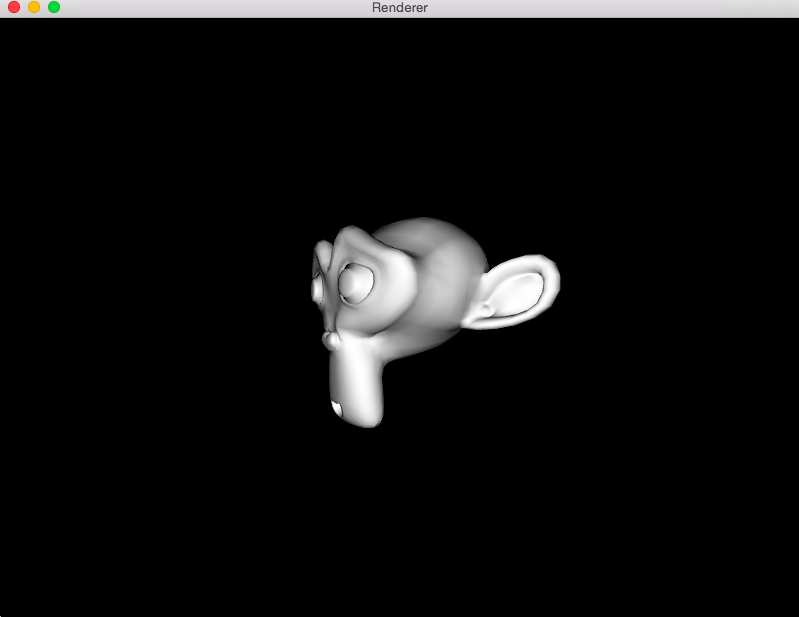Table Of Contents
3D Rotating Monkey Head(翻訳済み)¶
この例では、回転する猿の頭を表示するには、OpenGLを使用して実行しています。これは、OpenGLシェーディング言語(GLSL)で書かれたBlenderのOBJファイルとシェーダのロード、およびスケジュールされたコールバックを使用します。
monkey.objファイルは無料の3D作成ソフトBlenderからのOBJファイルを出力します。Objファイルは、バーテックス(頂点)と面のリストのテキストであり、 objloader.py ファイルのクラスを使用してロードされます。 ファイル simple.glsl はGLSLで書かれたシンプルな頂点およびフラグメントシェーダです。
File 3Drendering\main.py¶
'''
3D Rotating Monkey Head
========================
This example demonstrates using OpenGL to display a rotating monkey head. This
includes loading a Blender OBJ file, shaders written in OpenGL's Shading
Language (GLSL), and using scheduled callbacks.
The monkey.obj file is an OBJ file output from the Blender free 3D creation
software. The file is text, listing vertices and faces and is loaded
using a class in the file objloader.py. The file simple.glsl is
a simple vertex and fragment shader written in GLSL.
'''
from kivy.app import App
from kivy.clock import Clock
from kivy.core.window import Window
from kivy.uix.widget import Widget
from kivy.resources import resource_find
from kivy.graphics.transformation import Matrix
from kivy.graphics.opengl import *
from kivy.graphics import *
from objloader import ObjFile
class Renderer(Widget):
def __init__(self, **kwargs):
self.canvas = RenderContext(compute_normal_mat=True)
self.canvas.shader.source = resource_find('simple.glsl')
self.scene = ObjFile(resource_find("monkey.obj"))
super(Renderer, self).__init__(**kwargs)
with self.canvas:
self.cb = Callback(self.setup_gl_context)
PushMatrix()
self.setup_scene()
PopMatrix()
self.cb = Callback(self.reset_gl_context)
Clock.schedule_interval(self.update_glsl, 1 / 60.)
def setup_gl_context(self, *args):
glEnable(GL_DEPTH_TEST)
def reset_gl_context(self, *args):
glDisable(GL_DEPTH_TEST)
def update_glsl(self, *largs):
asp = self.width / float(self.height)
proj = Matrix().view_clip(-asp, asp, -1, 1, 1, 100, 1)
self.canvas['projection_mat'] = proj
self.canvas['diffuse_light'] = (1.0, 1.0, 0.8)
self.canvas['ambient_light'] = (0.1, 0.1, 0.1)
self.rot.angle += 1
def setup_scene(self):
Color(1, 1, 1, 1)
PushMatrix()
Translate(0, 0, -3)
self.rot = Rotate(1, 0, 1, 0)
m = list(self.scene.objects.values())[0]
UpdateNormalMatrix()
self.mesh = Mesh(
vertices=m.vertices,
indices=m.indices,
fmt=m.vertex_format,
mode='triangles',
)
PopMatrix()
class RendererApp(App):
def build(self):
return Renderer()
if __name__ == "__main__":
RendererApp().run()
File 3Drendering\objloader.py¶
class MeshData(object):
def __init__(self, **kwargs):
self.name = kwargs.get("name")
self.vertex_format = [
(b'v_pos', 3, 'float'),
(b'v_normal', 3, 'float'),
(b'v_tc0', 2, 'float')]
self.vertices = []
self.indices = []
def calculate_normals(self):
for i in range(len(self.indices) / (3)):
fi = i * 3
v1i = self.indices[fi]
v2i = self.indices[fi + 1]
v3i = self.indices[fi + 2]
vs = self.vertices
p1 = [vs[v1i + c] for c in range(3)]
p2 = [vs[v2i + c] for c in range(3)]
p3 = [vs[v3i + c] for c in range(3)]
u, v = [0, 0, 0], [0, 0, 0]
for j in range(3):
v[j] = p2[j] - p1[j]
u[j] = p3[j] - p1[j]
n = [0, 0, 0]
n[0] = u[1] * v[2] - u[2] * v[1]
n[1] = u[2] * v[0] - u[0] * v[2]
n[2] = u[0] * v[1] - u[1] * v[0]
for k in range(3):
self.vertices[v1i + 3 + k] = n[k]
self.vertices[v2i + 3 + k] = n[k]
self.vertices[v3i + 3 + k] = n[k]
class ObjFile:
def finish_object(self):
if self._current_object is None:
return
mesh = MeshData()
idx = 0
for f in self.faces:
verts = f[0]
norms = f[1]
tcs = f[2]
for i in range(3):
# get normal components
n = (0.0, 0.0, 0.0)
if norms[i] != -1:
n = self.normals[norms[i] - 1]
# get texture coordinate components
t = (0.0, 0.0)
if tcs[i] != -1:
t = self.texcoords[tcs[i] - 1]
# get vertex components
v = self.vertices[verts[i] - 1]
data = [v[0], v[1], v[2], n[0], n[1], n[2], t[0], t[1]]
mesh.vertices.extend(data)
tri = [idx, idx + 1, idx + 2]
mesh.indices.extend(tri)
idx += 3
self.objects[self._current_object] = mesh
# mesh.calculate_normals()
self.faces = []
def __init__(self, filename, swapyz=False):
"""Loads a Wavefront OBJ file. """
self.objects = {}
self.vertices = []
self.normals = []
self.texcoords = []
self.faces = []
self._current_object = None
material = None
for line in open(filename, "r"):
if line.startswith('#'):
continue
if line.startswith('s'):
continue
values = line.split()
if not values:
continue
if values[0] == 'o':
self.finish_object()
self._current_object = values[1]
# elif values[0] == 'mtllib':
# self.mtl = MTL(values[1])
# elif values[0] in ('usemtl', 'usemat'):
# material = values[1]
if values[0] == 'v':
v = list(map(float, values[1:4]))
if swapyz:
v = v[0], v[2], v[1]
self.vertices.append(v)
elif values[0] == 'vn':
v = list(map(float, values[1:4]))
if swapyz:
v = v[0], v[2], v[1]
self.normals.append(v)
elif values[0] == 'vt':
self.texcoords.append(map(float, values[1:3]))
elif values[0] == 'f':
face = []
texcoords = []
norms = []
for v in values[1:]:
w = v.split('/')
face.append(int(w[0]))
if len(w) >= 2 and len(w[1]) > 0:
texcoords.append(int(w[1]))
else:
texcoords.append(-1)
if len(w) >= 3 and len(w[2]) > 0:
norms.append(int(w[2]))
else:
norms.append(-1)
self.faces.append((face, norms, texcoords, material))
self.finish_object()
def MTL(filename):
contents = {}
mtl = None
return
for line in open(filename, "r"):
if line.startswith('#'):
continue
values = line.split()
if not values:
continue
if values[0] == 'newmtl':
mtl = contents[values[1]] = {}
elif mtl is None:
raise ValueError("mtl file doesn't start with newmtl stmt")
mtl[values[0]] = values[1:]
return contents
File 3Drendering\simple.glsl¶
1 2 3 4 5 6 7 8 9 10 11 12 13 14 15 16 17 18 19 20 21 22 23 24 25 26 27 28 29 30 31 32 33 34 35 36 37 38 39 40 41 42 43 44 45 46 47 | /* simple.glsl
simple diffuse lighting based on laberts cosine law; see e.g.:
http://en.wikipedia.org/wiki/Lambertian_reflectance
http://en.wikipedia.org/wiki/Lambert%27s_cosine_law
*/
---VERTEX SHADER-------------------------------------------------------
#ifdef GL_ES
precision highp float;
#endif
attribute vec3 v_pos;
attribute vec3 v_normal;
uniform mat4 modelview_mat;
uniform mat4 projection_mat;
varying vec4 normal_vec;
varying vec4 vertex_pos;
void main (void) {
//compute vertex position in eye_space and normalize normal vector
vec4 pos = modelview_mat * vec4(v_pos,1.0);
vertex_pos = pos;
normal_vec = vec4(v_normal,0.0);
gl_Position = projection_mat * pos;
}
---FRAGMENT SHADER-----------------------------------------------------
#ifdef GL_ES
precision highp float;
#endif
varying vec4 normal_vec;
varying vec4 vertex_pos;
uniform mat4 normal_mat;
void main (void){
//correct normal, and compute light vector (assume light at the eye)
vec4 v_normal = normalize( normal_mat * normal_vec ) ;
vec4 v_light = normalize( vec4(0,0,0,1) - vertex_pos );
//reflectance based on lamberts law of cosine
float theta = clamp(dot(v_normal, v_light), 0.0, 1.0);
gl_FragColor = vec4(theta, theta, theta, 1.0);
}
|

